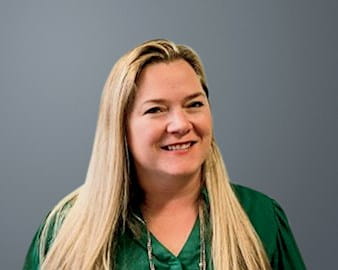Molly Wilson, ’07, found that her concentrations in strategy and finance while at Booth enabled her to take her business swiftly online when the COVID-19 pandemic hit. She shares her experience here.
In 2013 I look a leap from my corporate career. I had been working with Travelers, a property and casualty insurance company in St. Paul, Minnesota, but it was getting harder to balance family and a lot of business travel. So I shifted to join my sister, a child psychiatrist, and lead the administration at her small private mental health clinic in Woodbury, Minnesota. It was a difficult decision, but the opportunity to help grow a clinic felt more entrepreneurial and autonomous.
The business has grown every year since I joined. I started many initiatives through strategic organic growth. We engaged with a marketing company to work on elevating our professional image and branding, and worked on capacity planning for the future. The practice has steadily evolved, serving more patients and offering more options for care. We even built and opened a second location last fall.
One important shift was a migration to electronic- and cloud-based systems—in particular, to implement a strategic EMR (electronic medical records) platform. We evaluated and selected a platform in 2017 and transitioned to paperless records. We also put everything in the cloud, so we no longer use any on-site servers.
The ability to offer telehealth was something we’d been planning for. But when the pandemic hit, we suddenly had to move very quickly. We wanted to protect staff, especially since some staff were immunocompromised, and of course we needed to protect patients. Telehealth was the safest way forward. On March 13 I put together instructions for telehealth. We took March 16 to allow staff to prepare for telehealth services, and we went live the next day. Our staff rallied to make the telehealth implementation a rapid success in just a few days.
“There are a lot of potential applications of the shifts we’ve made.”
— Molly Wilson, ’07

So far, things have gone well. Most patients have been able to continue treatment, since our school district deployed laptops for kids who didn’t have them. The feedback has been very positive—children like sharing their experiences; they like to share items that are important to them from home; plus, there have been cats and dogs in the background.
It’s still hard to believe it happened so quickly. In many ways, the swift pivot was a culmination of everything I learned at Booth. One key learning was that there’s enormous value in having options. I look at every business decision as an opportunity: What could this allow us to do better or at a lower cost? What future opportunity could this position us for? Anytime we can have more options for a reasonable cost, we should obtain them. Thinking this way about telehealth allowed us to remain in business during the pandemic.
Booth cultivated my critical thinking, encouraging us to look ahead for opportunities and mitigate risks, and that has paid off in so many important ways. Mental health is a vital service to our community, and the ability to maintain continuity of care during these unprecedented, stressful times is profoundly rewarding. It will continue to be a daily challenge to manage staff and patients in our new virtual service model, but the alternative of closing our doors would have been devastating to employees and patients.
This pivot has also set us up for other initiatives in the future, even when the pandemic is over, such as offering greater access to mental health care in rural areas and online medication management. There are a lot of potential applications of the shifts we’ve made. It won’t be a perfect path forward, but there is a light ahead that we will continue to strive toward.
Illustration by Down the Street Designs


